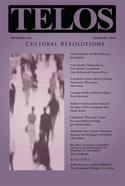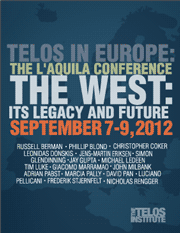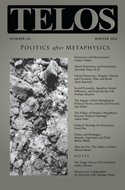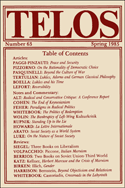By Reem Bassiouney · Thursday, July 11, 2013 Reem Bassiouney’s “Language and Revolution in Egypt” appears in Telos 163 (Summer 2013). Read the full version online at the Telos Online website, or purchase a print copy of the issue in our store.
 Based on the assumption that language is a social resource, this article contends that during political conflicts, issues of linguistic resources and access to them are disputed. Issues of inclusion and exclusion are predominant. Note that Egypt is a diglossic community, a community in which two language varieties exist each with a different function. Examples are drawn from Egyptian media directly before, during, and after the revolution of January 25, 2011. Two newspaper articles are analyzed in detail, as well as additional material from TV talk shows, films, Facebook pages, and poetry. The first section in this article outlines how linguists in the Arab world at large, and in Egypt in particular, have referred to the diglossic situation to explain and justify negative social and political phenomena, especially the lack of democracy. Section two discusses examples of linguistic manipulation that took place during the revolution and in which the Egyptian state media attempted to cast doubt on the identity and motivations of the protestors in Tahrir Square. The conflict was not one sided, and the Tahrir Square protestors counterattacked the state media through poetry and other means. The main contribution of this section is to show how the diglossic situation is used after the revolution to lay claims on political legitimacy and credibility of the revolutionaries rather than the pro-Mubarak group. In a final section, the concept of linguistic unrest is introduced and defined. Based on the assumption that language is a social resource, this article contends that during political conflicts, issues of linguistic resources and access to them are disputed. Issues of inclusion and exclusion are predominant. Note that Egypt is a diglossic community, a community in which two language varieties exist each with a different function. Examples are drawn from Egyptian media directly before, during, and after the revolution of January 25, 2011. Two newspaper articles are analyzed in detail, as well as additional material from TV talk shows, films, Facebook pages, and poetry. The first section in this article outlines how linguists in the Arab world at large, and in Egypt in particular, have referred to the diglossic situation to explain and justify negative social and political phenomena, especially the lack of democracy. Section two discusses examples of linguistic manipulation that took place during the revolution and in which the Egyptian state media attempted to cast doubt on the identity and motivations of the protestors in Tahrir Square. The conflict was not one sided, and the Tahrir Square protestors counterattacked the state media through poetry and other means. The main contribution of this section is to show how the diglossic situation is used after the revolution to lay claims on political legitimacy and credibility of the revolutionaries rather than the pro-Mubarak group. In a final section, the concept of linguistic unrest is introduced and defined.
Continue reading →
By Telos Press · Monday, June 17, 2013 The Difficulty of Democracy: Diagnoses and Prognoses
February 14–16, 2014
New York
In spite of its advantages as an ideal form of government, democracy has proven to be remarkably difficult to establish and to maintain in reality. While it remained a rare exception for much of human history, its spread in the modern world has not had the character of a triumphant march but rather of a tortured path dominated by failed attempts, transformations into dictatorship, and degenerations into civil war. Even the most successful cases, Great Britain, France, and the United States, were marked by a concurrence of the rise of democratic institutions with an imperialist expansion that created a de facto hierarchy of citizens and non-citizens familiar also in ancient Athens. The purpose of the Eighth Annual Telos conference will be to analyze the key characteristics of democracy in order to determine, first, the precise advantages and disadvantages of this form of government in comparison to alternatives, second, the reasons for its rarity and volatility, and, third, the factors that are essential for its stability. We welcome paper submissions that address issues such as classical and modern theories of democracy, case studies of successful or failed democracies around the world, antinomies and conflicts within established democracies, revolutionary movements as progenitors of democracy, degeneration of democracies into other forms of government, the importance of culture and representation for founding and maintaining democracy, and the economic requirements and consequences of democracy. Please send an abstract and short c.v. to dtpan@uci.edu by August 31, 2013.
Continue reading →
By Greg Melleuish · Monday, February 11, 2013 The following paper was presented at Telos in Europe: The L’Aquila Conference, held on September 7-9, 2012, in L’Aquila, Italy.
 We live in an age of History Wars. We live in an age of History Wars.
Most of them are national in focus.
There is, however, one that touches on the issue of Western civilization, and that is the perceived conflict between Western civilization and world history.
Advocates of world history castigate Western civilization for pretending to be universal when, in fact, it is partial and prejudiced.
Continue reading →
By Aryeh Botwinick · Friday, January 11, 2013 Aryeh Botwinick’s “Liberal Democracy, Negative Theory, and Circularity: Plato and Rawls” appears in Telos 161 (Winter 2012). Read the full version online at the Telos Online website, or purchase a print copy of the issue in our store.
 This paper argues that the best kind of philosophical defense of democracy is one that is worked out within the framework of negative theory. The phrase “negative theory” is being used on analogy with the term negative theology. Just as negative theology argues that we can only indefinitely say what God is not but cannot pinpoint in a positive sense what He is, so, too, negative theory advocates that we can only ceaselessly explore and highlight the limitations of reason, without being able to arrive at a positive content that is incontrovertible and uncontestable. This paper argues that the best kind of philosophical defense of democracy is one that is worked out within the framework of negative theory. The phrase “negative theory” is being used on analogy with the term negative theology. Just as negative theology argues that we can only indefinitely say what God is not but cannot pinpoint in a positive sense what He is, so, too, negative theory advocates that we can only ceaselessly explore and highlight the limitations of reason, without being able to arrive at a positive content that is incontrovertible and uncontestable.
Continue reading →
By Danilo Breschi · Friday, December 14, 2012 This paper was presented at Telos in Europe: The L’Aquila Conference, held on September 7-9, 2012, in L’Aquila, Italy.
 It is with Tocqueville that the term democracy acquires a positive connotation. When the first part of Democracy in America appeared in 1835, the very title came as a surprise. It was radically new, and it struck people like a bolt from the blue. Tocqueville took another unprecedented step when he associated democracy and equality. According to Aristotle, equality is an aspect of justice, not democracy. The equality that Tocqueville had in mind was not political or economic, but social; it referred to a social condition arising from equality of condition and from a pervasive egalitarian ethos. The latter reflected, in turn, the absence of a feudal past in the New World. Back in Europe and France, Tocqueville lived through the events of 1848, when the notion of “revolution” gained a socialist character. It is at such point that Tocqueville perceives a conflict between socialism and liberty: socialism means equality without liberty, while democracy stands for equality and freedom. He thus starts a new debate, that of the problematic relationship between equality and liberty, which draws on his dual political experiences in Europe and America. He discovers that it is through their synthesis that a political system capable of combining the best aspects of liberty and equality might emerge. Liberal democracy could therefore be born of the encounter between Europe and America, that is to say, the two main parts of the Western World. It is with Tocqueville that the term democracy acquires a positive connotation. When the first part of Democracy in America appeared in 1835, the very title came as a surprise. It was radically new, and it struck people like a bolt from the blue. Tocqueville took another unprecedented step when he associated democracy and equality. According to Aristotle, equality is an aspect of justice, not democracy. The equality that Tocqueville had in mind was not political or economic, but social; it referred to a social condition arising from equality of condition and from a pervasive egalitarian ethos. The latter reflected, in turn, the absence of a feudal past in the New World. Back in Europe and France, Tocqueville lived through the events of 1848, when the notion of “revolution” gained a socialist character. It is at such point that Tocqueville perceives a conflict between socialism and liberty: socialism means equality without liberty, while democracy stands for equality and freedom. He thus starts a new debate, that of the problematic relationship between equality and liberty, which draws on his dual political experiences in Europe and America. He discovers that it is through their synthesis that a political system capable of combining the best aspects of liberty and equality might emerge. Liberal democracy could therefore be born of the encounter between Europe and America, that is to say, the two main parts of the Western World.
Continue reading →
By Maja Sidzinska · Tuesday, December 4, 2012 As an occasional feature on TELOSscope, we highlight a past Telos article whose critical insights continue to illuminate our thinking and challenge our assumptions. Today, Maja Sidzinska looks at Alessandro Pizzorno’s “On the Rationality of Democratic Choice” from Telos 63 (Spring 1985).
 To presume that individual interests precede political action is not only to place the proverbial cart before the horse, it is to formulate a theory of social agency based on a belief in sequential phenomena sans justification for the particular sequence proposed. In “On the Rationality of Democratic Choice,” Alessandro Pizzorno argues that the system of political actions and interests is an annular one, which is why utilitarian and rational choice theories lack sufficient explanatory value. He proposes the goal of affirmation of socio-political identity is an alternative explanation of political action that does not speak the traditional language of costs and benefits, as that language is housed within a universalizing framework that doesn’t reflect reality. To presume that individual interests precede political action is not only to place the proverbial cart before the horse, it is to formulate a theory of social agency based on a belief in sequential phenomena sans justification for the particular sequence proposed. In “On the Rationality of Democratic Choice,” Alessandro Pizzorno argues that the system of political actions and interests is an annular one, which is why utilitarian and rational choice theories lack sufficient explanatory value. He proposes the goal of affirmation of socio-political identity is an alternative explanation of political action that does not speak the traditional language of costs and benefits, as that language is housed within a universalizing framework that doesn’t reflect reality.
Continue reading →
|
|
 Based on the assumption that language is a social resource, this article contends that during political conflicts, issues of linguistic resources and access to them are disputed. Issues of inclusion and exclusion are predominant. Note that Egypt is a diglossic community, a community in which two language varieties exist each with a different function. Examples are drawn from Egyptian media directly before, during, and after the revolution of January 25, 2011. Two newspaper articles are analyzed in detail, as well as additional material from TV talk shows, films, Facebook pages, and poetry. The first section in this article outlines how linguists in the Arab world at large, and in Egypt in particular, have referred to the diglossic situation to explain and justify negative social and political phenomena, especially the lack of democracy. Section two discusses examples of linguistic manipulation that took place during the revolution and in which the Egyptian state media attempted to cast doubt on the identity and motivations of the protestors in Tahrir Square. The conflict was not one sided, and the Tahrir Square protestors counterattacked the state media through poetry and other means. The main contribution of this section is to show how the diglossic situation is used after the revolution to lay claims on political legitimacy and credibility of the revolutionaries rather than the pro-Mubarak group. In a final section, the concept of linguistic unrest is introduced and defined.
Based on the assumption that language is a social resource, this article contends that during political conflicts, issues of linguistic resources and access to them are disputed. Issues of inclusion and exclusion are predominant. Note that Egypt is a diglossic community, a community in which two language varieties exist each with a different function. Examples are drawn from Egyptian media directly before, during, and after the revolution of January 25, 2011. Two newspaper articles are analyzed in detail, as well as additional material from TV talk shows, films, Facebook pages, and poetry. The first section in this article outlines how linguists in the Arab world at large, and in Egypt in particular, have referred to the diglossic situation to explain and justify negative social and political phenomena, especially the lack of democracy. Section two discusses examples of linguistic manipulation that took place during the revolution and in which the Egyptian state media attempted to cast doubt on the identity and motivations of the protestors in Tahrir Square. The conflict was not one sided, and the Tahrir Square protestors counterattacked the state media through poetry and other means. The main contribution of this section is to show how the diglossic situation is used after the revolution to lay claims on political legitimacy and credibility of the revolutionaries rather than the pro-Mubarak group. In a final section, the concept of linguistic unrest is introduced and defined.  We live in an age of History Wars.
We live in an age of History Wars.  This paper argues that the best kind of philosophical defense of democracy is one that is worked out within the framework of negative theory. The phrase “negative theory” is being used on analogy with the term negative theology. Just as negative theology argues that we can only indefinitely say what God is not but cannot pinpoint in a positive sense what He is, so, too, negative theory advocates that we can only ceaselessly explore and highlight the limitations of reason, without being able to arrive at a positive content that is incontrovertible and uncontestable.
This paper argues that the best kind of philosophical defense of democracy is one that is worked out within the framework of negative theory. The phrase “negative theory” is being used on analogy with the term negative theology. Just as negative theology argues that we can only indefinitely say what God is not but cannot pinpoint in a positive sense what He is, so, too, negative theory advocates that we can only ceaselessly explore and highlight the limitations of reason, without being able to arrive at a positive content that is incontrovertible and uncontestable.  To presume that individual interests precede political action is not only to place the proverbial cart before the horse, it is to formulate a theory of social agency based on a belief in sequential phenomena sans justification for the particular sequence proposed. In “On the Rationality of Democratic Choice,” Alessandro Pizzorno argues that the system of political actions and interests is an annular one, which is why utilitarian and rational choice theories lack sufficient explanatory value. He proposes the goal of affirmation of socio-political identity is an alternative explanation of political action that does not speak the traditional language of costs and benefits, as that language is housed within a universalizing framework that doesn’t reflect reality.
To presume that individual interests precede political action is not only to place the proverbial cart before the horse, it is to formulate a theory of social agency based on a belief in sequential phenomena sans justification for the particular sequence proposed. In “On the Rationality of Democratic Choice,” Alessandro Pizzorno argues that the system of political actions and interests is an annular one, which is why utilitarian and rational choice theories lack sufficient explanatory value. He proposes the goal of affirmation of socio-political identity is an alternative explanation of political action that does not speak the traditional language of costs and benefits, as that language is housed within a universalizing framework that doesn’t reflect reality. 

